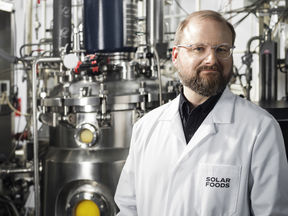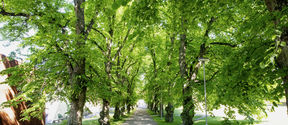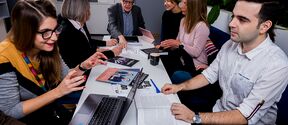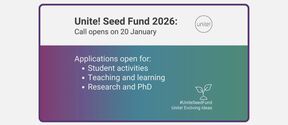Where do you work now and how did you end up in your current job?
I’m chief technology officer at Solar Foods and one of the founders of the company. We’re currently building a demonstration plant at Vehkala in Vantaa, which is a major investment. The company deals with a hydrogen economy in which we utilise carbon dioxide and renewable energy.
At the beginning of my career, I worked at VTT Technical Research Centre of Finland where we pondered how we could use woody biomass to produce biofuels and renewable chemicals. However, as a result of global economic changes, we started thinking about with what raw material we should actually replace oil. We wanted to focus on developing new products from carbon dioxide and renewable electricity. We thought on how carbon dioxide and electricity could be fed to microbes in the bioprocess, that is, we wanted to grow microbial biomass.
What makes Solar Foods special?
The world’s land area used for food production is larger than the forest area, and the production of food puts a strain on nature. There is demand for developing food that has as little environmental load as possible. In our process, production takes place in plant conditions. We utilise electricity and carbon dioxide, which means that a large part of the cost of the process consists of electricity. Carbon dioxide is reduced to energy-rich organic carbon compounds again. The product we call Solein is a powder that is 65% protein, and the rest is fat. The product contains a lot of vitamins, such as B12, iron and micronutrients, so it is a real superfood. Solein ice cream is sold in Singapore, and you can use it to make, for example, yogurt or products that replace milk, eggs and meat. This forms a basis for creating different applications.
How did you become a doctor of chemical engineering and why did you end up studying at Aalto (former Helsinki University of Technology)?
In my hometown Siilinjärvi, there is Kemira’s large open-pit mine where my father worked in artificial fertiliser production. The world of chemistry was always present in my life through my father’s work. Bioprocess engineering was my guideline that showed me the way at the beginning of my studies. I feel like I’m right where I belong right now. My education has shaped what I am today, and doctoral studies were an essential step in my career.
What was the most useful thing you learned during your studies?
In their welcome speech, the president of the university said that life is lifelong learning. Through education, you learn a certain way of approaching things, the so-called engineer’s perspective, but it’s good to remember that we can do so much more in working life than what we have studied as a major. I have worked in bioprocess engineering, which I studied, and learned mechanical engineering on the job. You learn by doing. Mastering mathematics and basic natural sciences separate us masters of science (technology) from other fields, and it’s good to know them.
What does being an Aalto alumnus mean to you?
The title of the alumnus of the year is a great honour, and I’m very pleased and delighted about it. When I was working at VTT Technical Research Centre of Finland, I often worked with Aalto, and I still sometimes do visiting lectures in some courses. I’ve also supervised several master’s theses. Otaniemi has developed tremendously since I studied there, but it’s still a dear place to me. At the moment, I can do exactly the work I thought I would when I started at the Helsinki University of Technology, and everything I’ve learned in my studies and working life helps me in this work and has prepared me for this.












